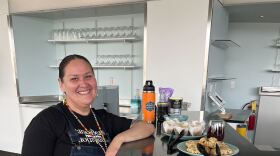Drug and alcohol abuse and addiction are a nationwide problem. Wisconsin is no exception.
To help address this issue in Ripon, Wis., the Ripon Police Department is bringing in outside help as a part of the Fond du Lac County Opioid Initiative. In partnership with WisHope, police officers now have 24/7 access to a peer recovery coach with lived addiction experience to help provide support and treatment options to those who need it.
LISTEN: WisHope Brings A Community Minded Approach To Addiction Recovery
"Thoughts of law enforcement in the past had been, 'I go out there and I arrest somebody for behavior, throw them in jail, and that's it'," says Bill Wallner, chief of the Ripon Police Department. "This is an issue that we just couldn't arrest our way out of. We know that in order to effectively combat opioid addiction and other addictions that we need to have partnerships."
According to the Wisconsin Department of Health Services, Ripon and Fond du Lac County as a whole have seen a slight increase in opioid deaths in the last year — to 9.7 deaths per 100,000 people. But they're still well under the county average of 15.8 deaths for the entire state.
Wallner says police officers were having trouble responding to drug calls and knowing which resources to direct people toward.
"It was very difficult for our officers. We had people coming in and begging for help, but we couldn't get them the resources they need or needed at that time when they were looking for help," he says.
That's where WisHope comes in, to serve as the resource that officers could refer to. Peter Brunzelle, the executive director of WisHope, describes the organization as the middle ground between law enforcement and health care.
WisHope trains staff to answer the question, "how can we connect someone to the care they need in real-time but also stay connected with them, so even if they don't want services right now how can we be in their life if they let us?" says Brunzelle.
"We had people coming in and begging for help, but we couldn't get them the resources they need or needed at that time when they were looking for help." - Ripon Chief of Police Bill Wallner
As calls for police reform and defunding the police are being considered, people on all sides of the debate agree that the police are being asked to do more than they ever have before. For Chief Wallner, this is why he partners with organizations like WisHope, which he recommends to other law enforcement agencies.
Moving forward, WisHope aims to change the culture around addiction treatment.
"I think decriminalizing it is that beginning piece of bringing about a change to the culture around what addiction is, how we view substance abuse, and how we treat it. So, behavior is one thing, addiction is another," says Brunzelle.
If you're struggling with addiction or know someone who is, here are some recovery resources:
General
- Jackie Nitschke Center
- Rogers Behavioral Health
- Substance Abuse and Mental Health Services Administration
Manitowoc
Milwaukee/Madison
- Wisconsin Voices for Recovery
- Metro Milwaukee Narcotics Anonymous
- Alcoholics Anonymous Milwaukee
- WisHope
- JustListen
Northeast Wisconsin (Green Bay area)
Sheboygan
- Wisconsin Recovery Community Organization
- Mental Health America
- Sheboygan Mobile Crisis: 920-459-3151







